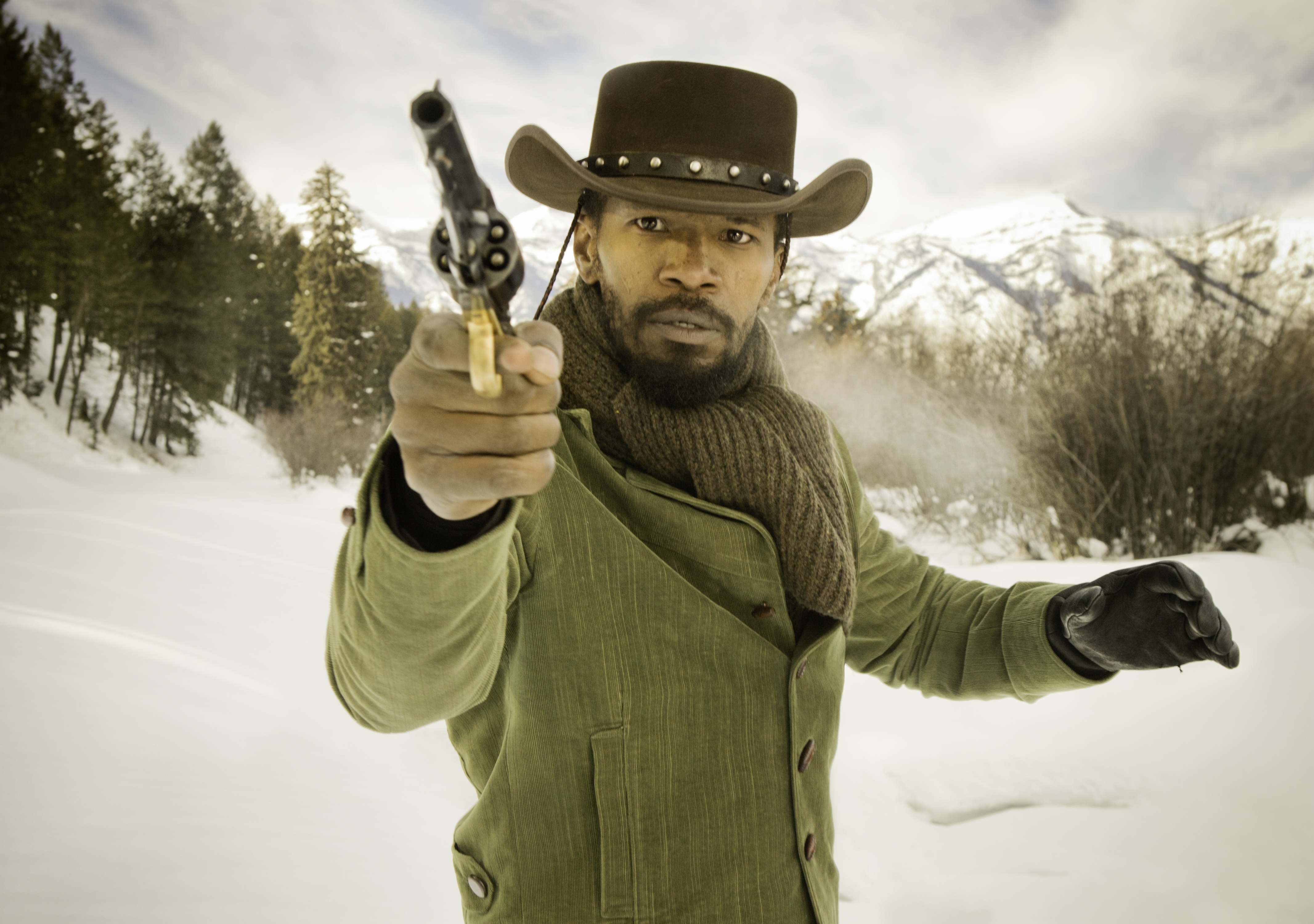Django Unchained: Tarantino’s Triumphant Return
Django (Jamie Foxx) goes from plantation slave to bounty hunter (Courtesy of Collider)
Django Unchained is Tarantino’s take on the spaghetti western genre. It’s set a couple of years before the Civil War. The recently purchased slave Django (Jamie Foxx) is on the way to his new plantation. On the way, Dr. King Shultz (Christoph Waltz, Oscar winner from Tarantino’s Inglorious Basterds) kills his way into purchasing Django. Shultz explains to Django that he abandoned dentistry for bounty hunting, and needs his help finding his next bounty, the Brittle brothers. Having never seen them in person, Shultz makes a deal with Django. In exchange for identifying his previous overseers, Django will receive $75 and his freedom from Shultz, who is sickened by the very notion of slavery.
Upon locating the brothers at a plantation, Django kills two himself, after a flashback reveals their previous cruelty to he and his wife, Broomhilda. Shultz, impressed by Django’s ferocity, proposes another deal. If Django partners up with Shultz in the bounty hunting business for the winter, Shultz will give Django one-third of his earnings and personally help Django rescue his wife. Django agrees, which leads to a montage of guns firing and a friendship strengthening. The on-screen chemistry between Foxx and Waltz is incredible, and I can’t say I’m surprised. Tarantino has a real talent for casting the right people.
When the winter ends, the two discover that Broomhilda is one of countless slaves owned by Calvin Candie (Leonardo DiCaprio) on his plantation, Candyland. DiCaprio gives a great performance as the cold aristocrat, shielding his cruelty with a fancy accent, a classy outfit and a big house. His head slave, Stephen, is suspicious of the two visitors, who arrive under the pretext of purchasing a hard-working slave at $12,000 in an attempt to undercut the price of Broomhilda, then leave without cutting a check for the expensive one. Stephen is portrayed by Samuel L. Jackson, who either believes he is white or sees his own race as inferior. Either way, Stephen doesn’t seem to be pro-emancipation, which makes Candyland all more provocative of a place. As usual, the conflict in Tarantino’s movie leads to an explosive spectacle of blood, bullets, blood, bodies and a lot of blood. And right when you think it’s all over, it isn’t.
I’m not so sure what it is about Tarantino that makes violence in his movies so enjoyable. He doesn’t glorify it, per se, but that being said, I was smiling during the entire climactic shoot-out scene. The only other times I could say I found such violence so enjoyable were Hit-Girl’s hallway massacre in Kick-Ass and the Crazy 88 samurai sword battle in Kill Bill Vol.1, Tarantino having directed the latter. Most filmmakers can’t make such a sensitive subject fun to watch, but somehow, Tarantino just…does it.
Two other aspects that Tarantino is unmatchable in are his script writing and casting. Like Pulp Fiction and Inglorious Basterds, Django Unchained is riddled with quotable dialogue. In his Palm d’Or acceptance speech for Pulp Fiction, Tarantino said his actors were able to turn “a pretty damn good script into an obsolete document.” It’s no different for Django, especially in the supporting performances. Foxx did well, but Waltz, DiCaprio and Jackson were all unspeakably outstanding. Kerry Washington, who played Broomhilda, gave the role of a discouraged woman over decades of oppression great justice.
This movie isn’t for everyone. It’s brutal, unwavering, and over-the-top. However, most will love the clever dialogue, eye-popping action, memorable performances and the signature direction from Tarantino. There's even a cameo from Jonah Hill in one of the funniest scenes of the year. My only complaint was the journey from Shultz and Foxx meeting Candie to when the characters arrived at Candyland. This was a classic case of Tarantino running his mouth. If he could see the audience’s reaction during this sequence, he might’ve taken the hint to shut up and get things going a little quicker. There was a twenty-five minute period that could’ve been streamlined or even eradicated, but it wasn’t. Other than that, Django Unchained is truly a solid Tarantino gem not to be missed.
Rating: 4.5/5

No comments:
Post a Comment